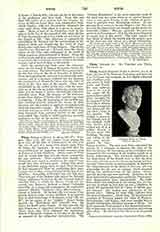

Titus, Bishop of Bostra, b. about 362-371. Sozomen (Hist. eccl., III, xiv) names Titus among the great men of the time of Constantius; he also tells (op. cit., V, xv) of a mean trick played upon Titus by Julian the Apostate. It was expected that the reestablishment of paganism would occasion riots in Bostra as it had elsewhere. Julian wrote to Titus that he would hold him and the clergy responsible for any outbreak. Titus replied that though the Christians were equal in number to the pagans they would obey him and keep quiet. Julian then wrote to the Bostrians urging them to expel Titus because he had calumniated them by attributing their quiet conduct not to their own good dispositions but to his influence. According to Socrates (op. cit., III, xxv) Titus was one of the bishops who signed the Synodal Letter, addressed to Jovian by the Council held at Antioch (363), in which the Nicene Creed was accepted, not, however, without a clause “intended somewhat to weaken and semi-arianize the expression omoousios” (Hefele, “Councils“, II, p. 283; ANTIOCH.—Synods of Antioch). St. Jerome (Ep. lxx) names Titus among writers whose secular erudition is as marvelous as their knowledge of Scripture; in his “De vir. cii, he speaks of his “mighty” (fortes) books against the Manichaean and nonnulla alia. He places his death under Valens. Of the nonnulla alia only fragments of exegetical writings have survived. These show that Titus followed the Antiochene School of Scripture exegesis in keeping to the literal as opposed to the allegorical interpretation. The”Contra Manichaeos” is the most important work of the kind that has come down to us, and its historic value is very great because of the number of quotations it contains from Manichaean writers. In one passage Titus seems to favor Origen’s view that the pains of the damned are not eternal (on this point see especially Ceillier, “Histoire générale des auteurs sacrés et ecclesiastiques”, VI p. 54, who seems disposed to acquit him of this error). The work consists of four books of which the fourth and the greater part of the third are only extant in a Syriac translation.
F. J. BACCHUS

